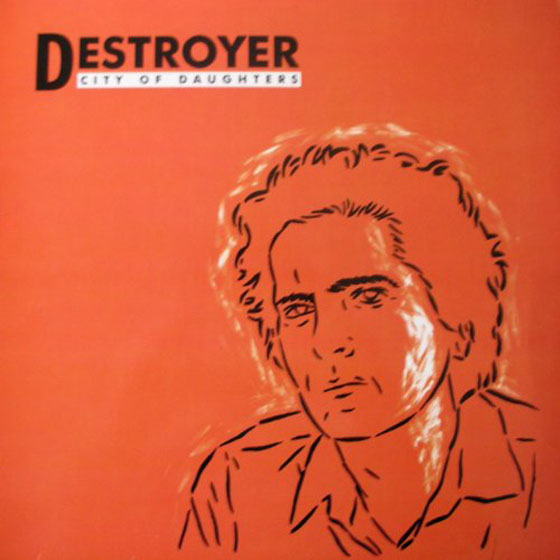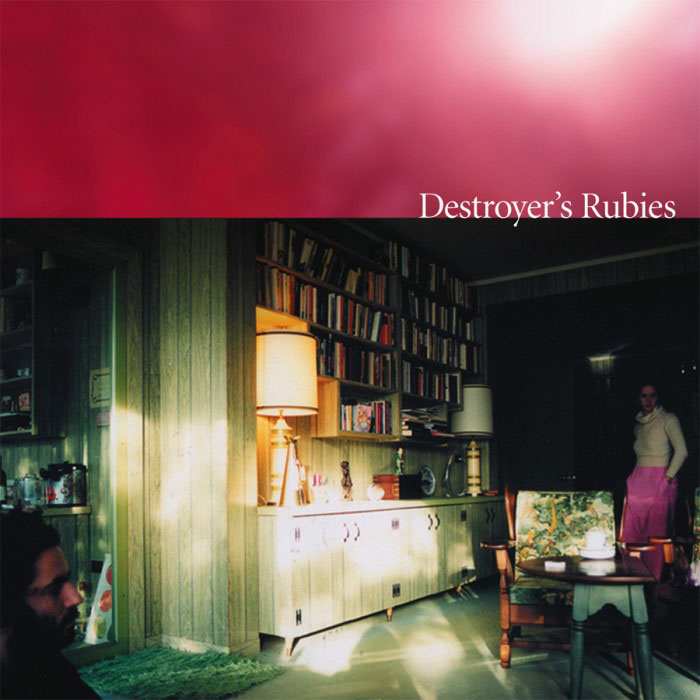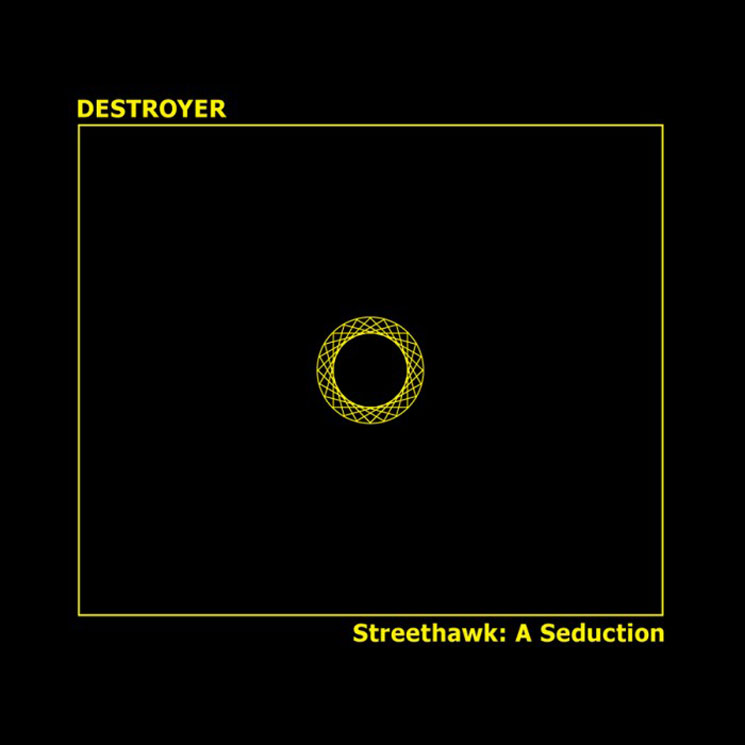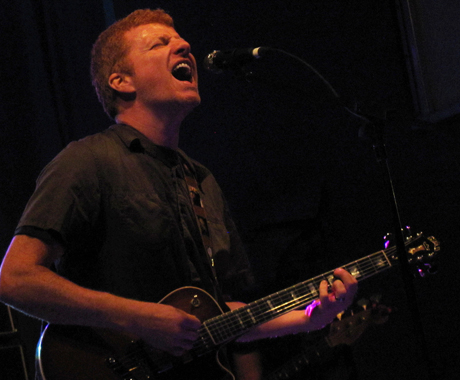Vancouver songwriter Dan Bejar has been releasing albums as Destroyer for nearly two decades, and in that time, he's managed to be at once wildly unpredictable and steadfastly dependable. What began as an acoustic guitar-driven project has become increasingly ambitious in scope. His albums have explored vastly different sonic terrain, from MIDI-driven theatrics to glam rock and dreamy adult contemporary jazz.
And yet, despite the stylistic diversity, each new foray sounds unmistakably like Destroyer: the albums are all united by Bejar's curious inflection, his cryptic poetry and his ability to borrow from decades past without sounding beholden to any specific sound or scene. Although the production differs vastly from one album to the next, Bejar's songwriting has remained fairly consistent.
On August 28, he will release his tenth album, Poison Season, at a time when Destroyer is reaching new levels of widespread acceptance and critical adoration. As we eagerly await his latest new frontier, join us in taking a look back at the best of Bejar's back catalogue.
5. City of Daughters
(1998)

Unlike most of Destroyer's albums, which typically focus on a specific sound or instrumental approach, City of Daughters finds Bejar going in a few different directions. There are a number of short acoustic sketches that are overlaid with CB radio static; there are cleanly produced folk-rock numbers that make occasional electronic forays; and there are a few avant-garde instrumental experiments. The stylistic inconsistency was partly due to a lack of money, as Bejar quickly laid down a few acoustic cuts as a way to finish the album. It was Bejar's first record with producers JC/DC — John Collins and David Carswell, who have worked on every subsequent Destroyer album — and while it's too scattered to be a full-blown classic, it's fascinating to hear Bejar's creative mind pulled in different directions. Highlights include "You Were So Cruel," a barebones ballad that stands out as one of the most riveting entries in Bejar's discography, and the eclectic folk-rock of "The Space Race," which rides the Vengabus with its goofy electro breakdown.
4. Your Blues
(2004)

When people discuss Bejar's tendency to approach each album as a sonically distinct project, Your Blues is inevitably the first one cited. Aside from Bejar's voice and acoustic guitar, the arrangements here consist entirely of MIDI instrumentation. While this is by no means the first time that an artist has used simulated synth instruments, it's hard to think of another high-profile album that has so brazenly embraced the crummy, artificial nature of its digital creation. Theatrical opener "Notorious Lightning" culminates with faux-drum-line percussion; "It's Gonna Take an Airplane" employs computerized flutes and strings; and spellbinding title track "Your Blues" begins as an a cappella lament before cavernous, Enya-worthy piano patches and echoing electro-sax provide gorgeous pathos. Your Blues came out in 2004, the same year that Apple released the first edition of its GarageBand recording software; even though most laptop users now have instant access to MIDI production, it's hard to find another example of anyone who has used it create anything as bold and interesting as this.
3. Destroyer's Rubies
(2006)

While Bejar had created full band records before, Destroyer's Rubies was the moment that his backing players became every bit as crucial as the frontman himself. These ten songs are gorgeously produced, as is perfectly exemplified by the towering, nine-and-a-half-minute opening cut "Rubies": the stately piano, thundering percussion, the odd horn, and fuzzy guitar hooks are all tied together by Bejar's acoustic strums, making for a sound that is lavishly ornate despite being made up of relatively standard instrumentation. "Your Blood" is an infectiously bouncy saloon number, "3000 Flowers" has a trace of surging punk and the majestic "European Oils" climaxes with the most memorable lyric of the entire Destroyer songbook: "She needs release / She needs to feel at peace with her father / The fucking maniac." Rubies was so brilliant that Bejar strove for a similar sound on 2008's Trouble in Dreams; while that follow-up was good, Rubies glitters with the kind of effortless-sounding magic that can only be captured once.
2. Kaputt
(2011)

Bejar had built up an admirable catalogue long before releasing Kaputt in 2011, but this was the first moment where he ever truly became a trendsetter. The album's dreamy, Avalon-esque arrangements are a blur of vamping jazz grooves, crooned vocals and — perhaps most notably — smooth saxophone solos. Suddenly, after Kaputt, it seemed like Kenny G-grade adult contemporary sax was everywhere you looked, and sounds typically associated with elevators and dentist waiting rooms became a favourite among indie acts. On this album, Bejar and his collaborators managed to reclaim bargain bin cheesiness and turn it into something brave and exciting. Thanks to the romantic, synth-blurred fantasia of "Savage Night at the Opera," the sultry schmaltz-pop of "Chinatown," the slippery funk-noir of "Suicide Demo for Kara Walker," the heavy-lidded haze of "Kaputt" and the 11-minute ambient disco epic "Bay of Pigs (Detail)," Kaputt stands out as the most daring, triumphant flight of fancy in a career that has been full of them.
1. Streethawk: A Seduction
(2001)

Streethawk: A Seduction is the transition point between the relative simplicity of Bejar's early work and the adventurous drama that he has explored since. It's a straight-for-the-gut record that frequently alludes to classic English rock: "The Bad Arts" builds to an epic, Joy Division-cribbing refrain of "You've got the spirit / Don't lose the feeling"; the "The Sublimation Hour" nabs the "phoney Beatlemania" line straight from "London Calling"; and the glammy arrangements throughout borrow from Ziggy Stardust-era David Bowie. "Strike" has the kind of heartstring-tugging piano that might have appeared on an early Rod Stewart album before it explodes with a devastating, cathartic finale. While subsequent records have expanded Destroyer's instrumental scope significantly, they've all been aiming for the soaring grandeur achieved on Streethawk. And this is to say nothing of the lyrics, which are packed with withering takedowns and brilliant witticisms: "You had the best legs in a business built for kicks"; "See them sporting those eagle iron-ons you made me swear never to wear"; "What could have been till you gave up the violin for a slight but distasteful penchant for men." While we've loved listening to Bejar's many stylistic excursions over the years, this album proves that all he really needs to create a sweeping masterpiece is a rock band in a room.
What to avoid:

Within Destroyer's catalogue, it's tough to go too horribly wrong. That being said, 1996's debut We'll Build Them a Golden Bridge is best suited for completists and those with a particular interest in lo-fi home recordings. Its ultra-rough sonic sketches were made with acoustic guitars and rinky-dink toy instruments, and its ramshackle solo style could scarcely be more different from the ornate, intricate beauty that Bejar has gravitated to in recent years. Devout followers will be interested to note that the album contains two cuts that were later turned into power-pop anthems for the New Pornographers: "Breakin' the Law" and "Streets of Fire."
In terms of Destroyer's full-band work, 2002's This Night is more exhausting than exhilarating. Although it has some solid rock tunes, it's a little too sprawling for its own good, since many of its 15 tracks are upwards of five or six minutes and are filled with loosey goosey (that is, sloppy) guitar jams. This Night doesn't accomplish any more in 68 minutes than Streethawk does in 43, making it feel like a relic of the CD era, when artists felt like they needed to fill up the disc to give fans their money's worth.
Further listening:

Bejar has been involved in various bands over the years, most notably the Vancouver power-pop ensemble the New Pornographers. He is one of the group's four lead singers (along with Carl Newman, Neko Case and Kathryn Calder), and he typically writes and sings three or four tracks per album. Some of his best contributions can be heard on 2000's debut Mass Romantic and 2014's Brill Bruisers.
Beyond that, Bejar has released two albums with Spencer Krug (Wolf Parade, Sunset Rubdown, Moonface) and Carey Mercer (Frog Eyes, Blackout Beach) under the name Swan Lake. Their debut, 2006's Beast Moans, is a murky, grey-scale affair that's soaked in echo and jumbled experimentation, while 2009's Enemy Mine is a brighter, clearer merging of art-rock talents. An early, extremely different version of the Trouble in Dreams standout "Shooting Rockets (From the Desk of Night's Ape)" appears on Beast Moans.
Bejar also plays a supporting role in Hello Blue Roses, an experimental folk band led by his romantic partner Sydney Hermant. They released The Portrait Is Finished and I Have Failed to Capture Your Beauty... in 2008 and WZO in February 2015; the albums bear Bejar's instrumental stamp, but lack his distinctive songwriting style.
And yet, despite the stylistic diversity, each new foray sounds unmistakably like Destroyer: the albums are all united by Bejar's curious inflection, his cryptic poetry and his ability to borrow from decades past without sounding beholden to any specific sound or scene. Although the production differs vastly from one album to the next, Bejar's songwriting has remained fairly consistent.
On August 28, he will release his tenth album, Poison Season, at a time when Destroyer is reaching new levels of widespread acceptance and critical adoration. As we eagerly await his latest new frontier, join us in taking a look back at the best of Bejar's back catalogue.
5. City of Daughters
(1998)

Unlike most of Destroyer's albums, which typically focus on a specific sound or instrumental approach, City of Daughters finds Bejar going in a few different directions. There are a number of short acoustic sketches that are overlaid with CB radio static; there are cleanly produced folk-rock numbers that make occasional electronic forays; and there are a few avant-garde instrumental experiments. The stylistic inconsistency was partly due to a lack of money, as Bejar quickly laid down a few acoustic cuts as a way to finish the album. It was Bejar's first record with producers JC/DC — John Collins and David Carswell, who have worked on every subsequent Destroyer album — and while it's too scattered to be a full-blown classic, it's fascinating to hear Bejar's creative mind pulled in different directions. Highlights include "You Were So Cruel," a barebones ballad that stands out as one of the most riveting entries in Bejar's discography, and the eclectic folk-rock of "The Space Race," which rides the Vengabus with its goofy electro breakdown.
4. Your Blues
(2004)

When people discuss Bejar's tendency to approach each album as a sonically distinct project, Your Blues is inevitably the first one cited. Aside from Bejar's voice and acoustic guitar, the arrangements here consist entirely of MIDI instrumentation. While this is by no means the first time that an artist has used simulated synth instruments, it's hard to think of another high-profile album that has so brazenly embraced the crummy, artificial nature of its digital creation. Theatrical opener "Notorious Lightning" culminates with faux-drum-line percussion; "It's Gonna Take an Airplane" employs computerized flutes and strings; and spellbinding title track "Your Blues" begins as an a cappella lament before cavernous, Enya-worthy piano patches and echoing electro-sax provide gorgeous pathos. Your Blues came out in 2004, the same year that Apple released the first edition of its GarageBand recording software; even though most laptop users now have instant access to MIDI production, it's hard to find another example of anyone who has used it create anything as bold and interesting as this.
3. Destroyer's Rubies
(2006)

While Bejar had created full band records before, Destroyer's Rubies was the moment that his backing players became every bit as crucial as the frontman himself. These ten songs are gorgeously produced, as is perfectly exemplified by the towering, nine-and-a-half-minute opening cut "Rubies": the stately piano, thundering percussion, the odd horn, and fuzzy guitar hooks are all tied together by Bejar's acoustic strums, making for a sound that is lavishly ornate despite being made up of relatively standard instrumentation. "Your Blood" is an infectiously bouncy saloon number, "3000 Flowers" has a trace of surging punk and the majestic "European Oils" climaxes with the most memorable lyric of the entire Destroyer songbook: "She needs release / She needs to feel at peace with her father / The fucking maniac." Rubies was so brilliant that Bejar strove for a similar sound on 2008's Trouble in Dreams; while that follow-up was good, Rubies glitters with the kind of effortless-sounding magic that can only be captured once.
2. Kaputt
(2011)

Bejar had built up an admirable catalogue long before releasing Kaputt in 2011, but this was the first moment where he ever truly became a trendsetter. The album's dreamy, Avalon-esque arrangements are a blur of vamping jazz grooves, crooned vocals and — perhaps most notably — smooth saxophone solos. Suddenly, after Kaputt, it seemed like Kenny G-grade adult contemporary sax was everywhere you looked, and sounds typically associated with elevators and dentist waiting rooms became a favourite among indie acts. On this album, Bejar and his collaborators managed to reclaim bargain bin cheesiness and turn it into something brave and exciting. Thanks to the romantic, synth-blurred fantasia of "Savage Night at the Opera," the sultry schmaltz-pop of "Chinatown," the slippery funk-noir of "Suicide Demo for Kara Walker," the heavy-lidded haze of "Kaputt" and the 11-minute ambient disco epic "Bay of Pigs (Detail)," Kaputt stands out as the most daring, triumphant flight of fancy in a career that has been full of them.
1. Streethawk: A Seduction
(2001)

Streethawk: A Seduction is the transition point between the relative simplicity of Bejar's early work and the adventurous drama that he has explored since. It's a straight-for-the-gut record that frequently alludes to classic English rock: "The Bad Arts" builds to an epic, Joy Division-cribbing refrain of "You've got the spirit / Don't lose the feeling"; the "The Sublimation Hour" nabs the "phoney Beatlemania" line straight from "London Calling"; and the glammy arrangements throughout borrow from Ziggy Stardust-era David Bowie. "Strike" has the kind of heartstring-tugging piano that might have appeared on an early Rod Stewart album before it explodes with a devastating, cathartic finale. While subsequent records have expanded Destroyer's instrumental scope significantly, they've all been aiming for the soaring grandeur achieved on Streethawk. And this is to say nothing of the lyrics, which are packed with withering takedowns and brilliant witticisms: "You had the best legs in a business built for kicks"; "See them sporting those eagle iron-ons you made me swear never to wear"; "What could have been till you gave up the violin for a slight but distasteful penchant for men." While we've loved listening to Bejar's many stylistic excursions over the years, this album proves that all he really needs to create a sweeping masterpiece is a rock band in a room.
What to avoid:

Within Destroyer's catalogue, it's tough to go too horribly wrong. That being said, 1996's debut We'll Build Them a Golden Bridge is best suited for completists and those with a particular interest in lo-fi home recordings. Its ultra-rough sonic sketches were made with acoustic guitars and rinky-dink toy instruments, and its ramshackle solo style could scarcely be more different from the ornate, intricate beauty that Bejar has gravitated to in recent years. Devout followers will be interested to note that the album contains two cuts that were later turned into power-pop anthems for the New Pornographers: "Breakin' the Law" and "Streets of Fire."
In terms of Destroyer's full-band work, 2002's This Night is more exhausting than exhilarating. Although it has some solid rock tunes, it's a little too sprawling for its own good, since many of its 15 tracks are upwards of five or six minutes and are filled with loosey goosey (that is, sloppy) guitar jams. This Night doesn't accomplish any more in 68 minutes than Streethawk does in 43, making it feel like a relic of the CD era, when artists felt like they needed to fill up the disc to give fans their money's worth.
Further listening:

Bejar has been involved in various bands over the years, most notably the Vancouver power-pop ensemble the New Pornographers. He is one of the group's four lead singers (along with Carl Newman, Neko Case and Kathryn Calder), and he typically writes and sings three or four tracks per album. Some of his best contributions can be heard on 2000's debut Mass Romantic and 2014's Brill Bruisers.
Beyond that, Bejar has released two albums with Spencer Krug (Wolf Parade, Sunset Rubdown, Moonface) and Carey Mercer (Frog Eyes, Blackout Beach) under the name Swan Lake. Their debut, 2006's Beast Moans, is a murky, grey-scale affair that's soaked in echo and jumbled experimentation, while 2009's Enemy Mine is a brighter, clearer merging of art-rock talents. An early, extremely different version of the Trouble in Dreams standout "Shooting Rockets (From the Desk of Night's Ape)" appears on Beast Moans.
Bejar also plays a supporting role in Hello Blue Roses, an experimental folk band led by his romantic partner Sydney Hermant. They released The Portrait Is Finished and I Have Failed to Capture Your Beauty... in 2008 and WZO in February 2015; the albums bear Bejar's instrumental stamp, but lack his distinctive songwriting style.
